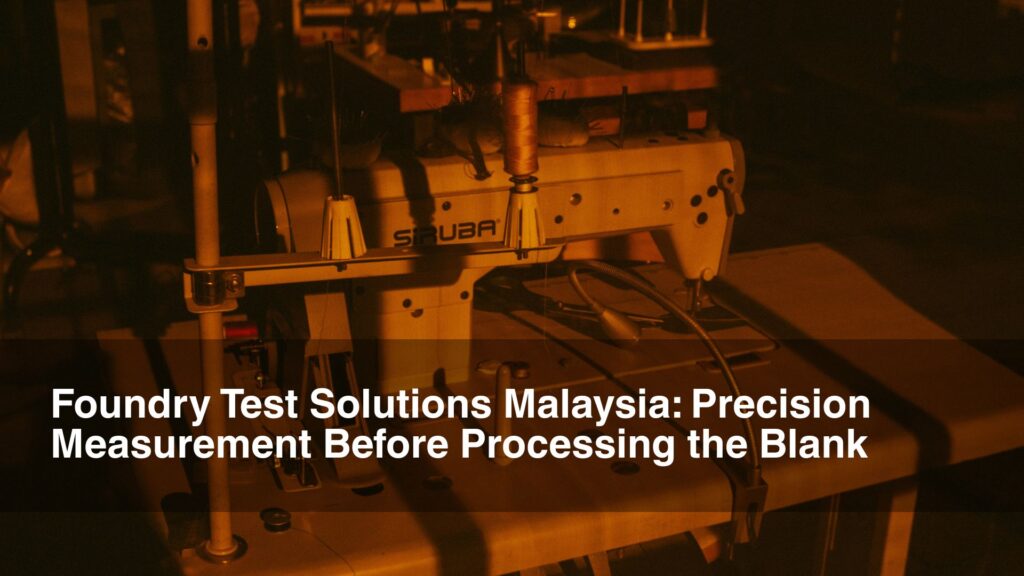Introduction to Foundry Test Solutions Malaysia
Foundry test solutions Malaysia represent a crucial component in the manufacturing pipeline, focusing on the evaluation and measurement of material properties prior to the processing of blanks. These test solutions utilize a range of methodologies that ensure the metals and alloys used in production meet the requisite quality standards. As the manufacturing sector in Malaysia continues to evolve, the spotlight on precision measurement has intensified, underscoring its significance in enhancing material quality and compliance with industry standards.
A core aspect of foundry test solutions is the ability to assess the mechanical properties, chemical composition, and microstructural integrity of materials. This verification process is a pivotal step that can prevent costly errors and ensure that the end products will perform as expected under various conditions. In an industry where precision is paramount, Malaysia’s foundry test solutions cater to both local and international demands, positioning the country as a competitive player in the global market.
Malaysia has cultivated a reputation for offering advanced testing methodologies and services tailored to meet the diverse needs of the foundry sector. The combination of skilled expertise, state-of-the-art technologies, and adherence to international standards contributes to the reliability of these testing solutions. Consequently, organizations that invest in foundry test solutions in Malaysia can attain an enhanced level of confidence in their materials, fostering innovation and quality in their manufacturing processes. The continuing advancements in testing technologies and methodologies indicate a promising future for the precision measurement landscape in Malaysia, particularly in the context of high-quality foundry operations.
The Importance of Precision Measurement in Foundry Test Solutions Malaysia
Precision measurement plays a critical role in the effectiveness of foundry test solutions in Malaysia. Accurate measurements can significantly influence the outcome of subsequent machining processes, directly impacting both product quality and overall operational efficiency. By ensuring that raw materials are assessed with impeccable accuracy prior to processing, foundries can avert potential issues related to material wastage. This is particularly important in high-stakes industries where resources are costly and the demand for quality is paramount.
When measurements are precise, the likelihood of defects arising during machining operations is substantially reduced. Flaws that stem from inaccuracies can lead to significant financial losses and reputational damage, as substandard products may fail to meet client expectations or industry standards. Utilizing advanced foundry test solutions helps to guarantee that the material specifications match the predefined requirements, providing a robust foundation for subsequent production stages. With proper measurement protocols in place, manufacturers can produce parts that adhere to exact tolerances, thus enhancing the reliability of the end products.
Adopting precision measurement practices not only supports better quality control but also grants a competitive edge. Companies that invest in high-quality foundry test solutions in Malaysia are better positioned to meet stringent market demands and regulatory requirements. This approach fosters stronger buyer-supplier relationships, as clients increasingly prioritize quality assurance in their purchasing decisions.
In conclusion, the significance of precision measurement in foundry test solutions cannot be overstated. It leads to enhanced product quality, minimizes waste, and significantly reduces the potential for defects. Ultimately, this will position manufacturers in Malaysia for sustained success in an increasingly competitive landscape.
Advanced Tools Used in Foundry Test Solutions Malaysia
The efficacy of foundry test solutions in Malaysia is significantly enhanced through the utilization of advanced tools and technologies. Precision measurement is critical in the foundry industry, where the integrity of the products hinges on accurate specifications. A variety of measurement instruments play crucial roles in ensuring high standards are met throughout the manufacturing process.
One of the most significant instruments employed is the Coordinate Measuring Machine (CMM). CMMs are vital for obtaining precise dimensional measurements by utilizing a probe that contacts the surface of the object being inspected. The flexibility of CMMs allows them to function in both contact and non-contact modes, adapting to various materials and complexities associated with foundry products. By offering high accuracy in three-dimensional space, CMMs enable manufacturers to detect deviations from desired specifications early in the production process, thus reducing potential errors in the final products.
In addition to CMMs, laser scanners are increasingly adopted in foundry test solutions in Malaysia. These devices use laser beams to capture accurate geometrical data from the surfaces of objects. The ability to gather thousands of data points quickly is invaluable for creating comprehensive 3D models of components, which further aids in the analysis and assessment of dimensional accuracy. The data generated can be utilized for quality control, inspection, and reverse engineering, ensuring that every aspect of production meets stringent quality thresholds.
Other high-precision tools, including surface roughness testers and digital calipers, complement these advanced measurement techniques. Collectively, these instruments form a robust framework that underpins the reliability of foundry test solutions in Malaysia, delivering accuracy that manufacturers require to thrive in a competitive environment. Ultimately, the integration of these technologies signifies the commitment to quality and innovation in the foundry sector.
Step-by-Step Process of Measuring Blanks with Foundry Test Solutions Malaysia
Measuring blanks with foundry test solutions in Malaysia is a systematic approach that ensures precision and accuracy before machining takes place. The process begins with the preparation of the blanks, which is crucial for subsequent measurements. The first step is to clean the blanks thoroughly to remove any contaminants or debris that could affect the accuracy of the measurements. Using a combination of solvent and lint-free cloth, operators maintain a clean working environment that is essential for achieving reliable results.
Next, the dimensions of the blanks are assessed using calibrated measuring tools. These tools may include calipers, micrometers, and digital measuring machines specifically designed for foundry test solutions in Malaysia. Proper alignment of the blank within the measuring apparatus is vital to ensure that the readings taken will reflect the true dimensions of the blank. Each measurement should be recorded meticulously, as these values serve as critical data points for further analysis.
Once the dimensional measurements are completed, the next phase involves assessing any mechanical properties required by the machining process. This might include hardness testing or tensile strength evaluations, which provide valuable insight into the performance characteristics of the materials used. Employing standardized testing protocols ensures consistency and reliability in results, thereby reinforcing the precision as defined by the foundry test solutions in Malaysia.
After conducting the necessary evaluations, a final analysis phase is conducted. This encompasses reviewing all measurement data and test results to identify any anomalies or deviations from expected standards. This analytical step is paramount for quality control, ensuring that all blanks uphold the rigorous specifications before they move on to the machining stage. Ultimately, the comprehensive steps utilized in measuring blanks demonstrate how foundry test solutions in Malaysia contribute heavily to precision manufacturing.
Case Studies: Success Stories from Foundry Test Solutions Malaysia
Numerous organizations across Malaysia have benefitted significantly from the implementation of foundry test solutions, leading to noticeable advancements in their production capabilities and improvements in material integrity. One notable case is a leading automotive parts manufacturer in Selangor, which faced challenges related to the quality and consistency of their cast components. By integrating advanced foundry test solutions Malaysia offered, the organization was able to perform accurate material testing and structural integrity assessments. Subsequent adjustments in their processes resulted in a 25% reduction in defects, enhancing product reliability and customer satisfaction.
Another success story comes from a foundry in Penang that specializes in aerospace components. They adopted state-of-the-art foundry test solutions to refine their quality control processes. The deployment of non-destructive testing methods allowed them to identify potential flaws early in the production cycle. As a result, the foundry achieved AS9100 certification and opened avenues for export, significantly boosting their market presence and competitive edge in the aerospace sector.
In a different industry, a Malaysian company producing industrial machinery implemented foundry test solutions that focused on thermal analysis and alloy composition verification. This endeavor resulted in superior performance of machined products, which were previously prone to premature wear and failures. Their rigorous testing procedures not only improved the durability of their offerings but also resulted in considerable cost savings on warranty claims and customer returns over time.
These examples illustrate the tangible benefits derived from using foundry test solutions in Malaysia. Organizations that employ these technologies can achieve better quality control while ensuring compliance with industry standards. The successful case studies highlight that effective testing methodologies, when integrated thoughtfully into production processes, can lead to both operational enhancements and improved outcomes in material integrity.
Challenges Faced in Precision Measurements and Foundry Test Solutions Malaysia
Precision measurement in foundry test solutions Malaysia poses various challenges that can significantly impact the quality and integrity of cast products. One primary issue is equipment limitations. Advanced measuring instruments are crucial for accurate assessments; however, many foundries may not possess the latest technology due to budget constraints or insufficient investments. The inadequacy of equipment can lead to discrepancies in measurements, ultimately affecting the casting quality and leading to increased rework or wastage.
Environmental factors also play a crucial role in precision measurements. Variations in temperature and humidity can significantly affect the properties of materials being tested. For instance, metal components may expand or contract due to temperature fluctuations, resulting in inaccurate measurements. To mitigate this, foundries need to establish controlled environments for testing, ensuring stable conditions that allow for consistent measurement accuracy. This could involve investing in climate control systems to regulate operational environments for better results.
Moreover, the need for skilled technicians presents another challenge. The complexity of precision measurement techniques requires highly trained personnel. Insufficient knowledge or expertise among technicians can result in incorrect measurements, further complicating the testing process. Therefore, continuous training and development programs are essential to equip foundry workers with the necessary skills. Partnerships with educational institutions or industry bodies can facilitate essential training modules to address this gap effectively.
Overall, a comprehensive approach that encompasses upgrading equipment, managing environmental conditions, and enhancing technician skills is crucial for overcoming these challenges in foundry test solutions Malaysia. Advocating for these improvements can lead to not only enhanced precision in measurement but also an overall increase in production efficiency and quality in the foundry industry.
Future Trends in Foundry Test Solutions Malaysia
The landscape of foundry test solutions in Malaysia is poised to undergo significant transformation in the coming years, driven by advancements in technology and evolving industry standards. Emerging technologies such as artificial intelligence (AI) and machine learning are set to revolutionize how foundries approach precision measurement. These innovations will allow for the automation of testing processes, fostering increased accuracy and efficiency in foundry test solutions Malaysia.
Incorporating advanced analytics, foundries will be able to monitor and evaluate vast amounts of data in real-time, facilitating proactive decision-making and minimizing downtime. Such integration of AI not only enhances the precision of measurements but also streamlines operations by identifying potential defects earlier in the process, thereby reducing waste and cost.
Moreover, the adoption of Industry 4.0 principles in Malaysian foundries is expected to drive the development of smart manufacturing environments. This shift will involve the utilization of Internet of Things (IoT) devices that connect machinery and testing equipment, enabling seamless data exchange and increased collaboration across the supply chain. As a result, foundry test solutions will not only focus on product quality but also on operational efficiency, providing a more holistic approach to manufacturing.
Another critical aspect of future trends is the emphasis on eco-friendly products and practices. The demand for sustainable foundry test solutions in Malaysia will require companies to adopt greener technologies. This involves transitioning to water-based and biodegradable testing materials to minimize the environmental impact during the measurement process. As regulations and consumer preferences shift towards sustainability, foundries that embrace these practices will likely gain a competitive edge.
In conclusion, the future of foundry test solutions in Malaysia will be shaped by technological advancements and a focus on sustainability. By leveraging emerging tools and practices, the industry can enhance precision measurement while meeting the evolving expectations of clients and regulatory bodies alike.
Regulatory Standards and Compliance in Foundry Test Solutions Malaysia
In the context of foundry test solutions Malaysia, the significance of regulatory standards and compliance cannot be overstated. The foundry industry is subject to numerous regulations that aim to ensure the quality and safety of manufactured products. Adherence to these standards is not only a requisite for legal compliance but also a critical component for maintaining customer satisfaction and competitive advantage in the market.
In Malaysia, several national and international standards influence the implementation of foundry test solutions. The Malaysian Standards (MS) by the Department of Standards Malaysia provide guidelines for various manufacturing processes, which include the requirements for testing and quality assurance in foundries. These standards ensure that all produced castings comply with specific tolerances and mechanical properties. Furthermore, ISO standards play a pivotal role in establishing a globally recognized framework for quality control, encompassing all aspects of the foundry process, from material selection to final inspections.
Compliance with these standards aids foundries in optimizing their operational processes, reducing waste, and minimizing production errors, ultimately leading to enhanced product quality. Moreover, regulatory bodies often conduct audits and reviews to ensure that foundries are adhering to these regulations. In the event of non-compliance, foundries may face significant repercussions, including legal penalties, loss of certifications, and declining customer trust.
Therefore, it is crucial for stakeholders in the foundry sector to stay updated with the latest regulations and industry standards, implementing the necessary measures for compliance. This vigilance not only addresses legal requirements but also fosters a culture of quality assurance that can positively impact customer relationships and brand reputation. By investing in reliable foundry test solutions Malaysia, organizations position themselves to meet these regulatory expectations and thrive in an increasingly competitive landscape.
Conclusion: The future for Foundry Test Solutions Malaysia
In the landscape of manufacturing, precision measurement serves as a cornerstone for quality assurance, particularly in the realm of foundry test solutions Malaysia. These advanced methodologies provide a robust framework for detecting potential defects and ensuring material integrity before the processing of the blank. As industries continue to evolve, the reliance on sophisticated foundry test solutions has become paramount in safeguarding operational efficiency and meeting stringent product requirements.
The integration of foundry test solutions in Malaysia not only enhances the accuracy of measurements but also streamlines processes and reduces the likelihood of costly errors. By investing in state-of-the-art technology and adopting rigorous testing protocols, manufacturers can significantly improve their production standards. This is particularly vital in an environment where the competitive edge is often defined by the ability to deliver high-quality products in a timely manner.
Moreover, the proactive nature of these foundry test solutions fosters a culture of innovation within the manufacturing sector. By prioritizing precision measurement, businesses can explore new materials and production techniques, ultimately leading to the development of improved designs and processes. The emphasis on thorough testing ensures that innovations are not only feasible but also sustainable in the long run.
As Malaysia positions itself as a key player in the global manufacturing market, the role of foundry test solutions becomes increasingly critical. The commitment to excellence through precise measurement not only reinforces product quality but also contributes to a safer and more efficient manufacturing ecosystem. Ultimately, embracing these solutions is essential for manufacturers aiming to thrive in today’s fast-paced and competitive environment, making it clear that precision is not simply an advantage but a necessity in driving innovation forward.










